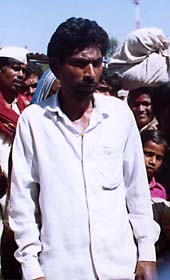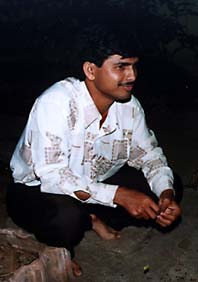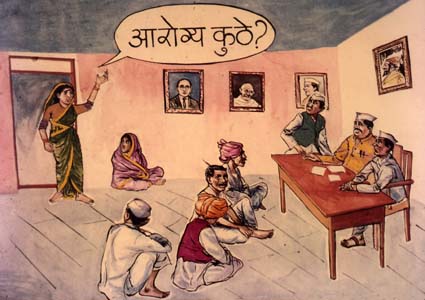Grassroot socio-cultural action and development
Pandit Padalghare and Jitendra Maid
Village Community Development Association (VCDA)
This is an excerpt of a paper presented by the authors in the April 1997
seminar "Culture, Communication and Power" organised by Centre de
Sciences Humaines (CSH, New Delhi) and CCRSS.
Communication observatory
Presently we are organizing a training meeting for local animators of the
Poor of the Mountain from different villages.
|

Pandit Padalghare |
As an observation exercise, we start requesting them to draw a map of their
village. Each one has to draw on the map of his/her village in particular what
will reveal the social structures, social relations and all forms of social
communication or discrimination (e.g. meeting places, footpaths, distance
between settlements or houses, the relative position of the latter, signs of
social differentiations, land distribution, cropping patterns, etc.). The
drawing and the minute study of each one's map in the group help animators to
understand hierarchical and unequal social frameworks, economic structures,
cultural specificities, etc. The skills expected to be acquired with this
exercise are, in particular, a capacity of minute observation, the ability to
discover the social and cultural import of each detail, a deep insight into the
rapports of communication or exclusion which prevail. Other institutions do
statistical surveys: we do not believe in that. |
|
Rural volunteers from different parts of rural Maharashtra come to
participate in that training workshop. They are expected to study any subject
of their concern on their own, relying on their intellectual capacities and as
per their degree of concern and commitment. Information and knowledge are
secondary though important aims of the workshop. Each participant is to present
his view and understanding of social issues which he finds particularly
relevant, and possibly his own experiences in the matter. Every participant
ought to learn how to clearly articulate his/her own thoughts and submit them to
the group scrutiny. After thought provoking discussion they use to get some new
direction, new light from the questioning and experiences of others, provided
they are ready to accept the suggestions and critiques. Free communication is
the basis of the intellectual progress of all. No experts are called to be
passively relied on as upon an alien or elder authority. |

Jitendra Maid |
At the end of each six-day sessions we prepare reports which are circulated
and read with interest in each one's local group. The report becomes the basis
for further discussion in the next session besides being used by the local group
as an extension of the self-learning process of the general session. This
method spreads the thoughts and helps creating chains of groups of like-minded
workers. This methodology is meant to boost the capacity of free and personal
thinking, and qualities of mental autonomy, personal conviction. The
participants are unable to forget the experience and education that they get in
the workshop. We give stress on the process of listening others' thoughts and
experiences, analysing them, forming and justifying one's own opinions and
arriving at the correct conclusion as a result of prolonged questioning. We
insist on the transparency of the communication processes which should take
place on equal level. Nobody is big or small, more learned than another. Every
participant is on equal footing. The group as a milieu of communication stands
as the source of knowledge.
Health programmes
For the last seventeen years, we run a health programme. We give importance
to health education and not to the distribution of medicines. No dispensary.
The health animators -- most of them are women -- those with no formal school
education or those who have gone to the school know only alphabet. During the
training meetings issues of primary health care concentrating on preventive
measures and public health are discussed. In the remote areas where the primary
health centres are not reaching these health animators work as health workers
(VHO). In the society, health of women is particularly neglected because of
socio-cultural reasons. So we concentrate on the problems of women health. We
organize health camps lasting a week where we show slides on women reproductive
health and then charts and posters on diseases like aids and jaundice, the bad
effects of tobacco chewing and cigarette smoking, etc. We make propaganda
against injections, etc. At the same time we exhibit real human organs which
create attraction in particular for school children. 'Scientific' experiments
against cheating practices of 'magicians' are also arranged.
Agricultural labourers, Employment Guarantee Scheme workers
People should plan the development work of their village. With this
intention, animators of the Poor of the Mountain, started gathering
agricultural labourers, Employment Guarantee Scheme workers. Now these people
have become conscious that they can plan for the development of their area,
finding out work sites. Now they are demanding the incorporation of the right
to employment in the constitution. Through various programmes, meetings,
demonstrations, etc. , the consciousness has been created that it is the
responsibility and right of local people to participate in the decision making
process and have authority to deal with all such issues, and not only the duty
or right of the government. A small step towards perspectives of economic
democracy.
Child labourers
How do they exist at all and where do their problems arise from? They are a
result of exploitative social constraints, values and norms. The poverty of the
parents, root cause of child labour, is a socio-economic problem. Children are
deprived of their childhood, they can not take education. We take meetings,
organize these children and create a space for them to express their qualities
and skills. As we arrange programmes where school-going children too take part
with those who can not go to school, both of them come to understand one another
better. Educational games and exercises of observation increase the capacity to
observe and think over the situation. All is based on free exchange between
children.
Abandoned women
Their problems are not individual or personal issues. Social structures
explain for this. While establishing personal contacts the objective is to
create a collective consciousness. Women should understand that they are
victims of social evils. We take meetings, camps. We have prepared a street
play on this problem using folk forms of expression. We may take the help of
court and legislation, though the court offers only a very limited scope. We
try to act at the level of every day relationships, forms and systems of social
relations. We bring together both the parties with their families for exchange
and discussions. Collective debates try to solve individual problems while
proving conducive to tackle issues of socio-cultural transformation.
|

What about health care?
A meeting of the village
council |
Women members of village panchayats
With the reservation policy of 33% seats for women in local bodies, women
happen to be elected for the first time. They immediately discover that they
are completely unaware of the rules, regulations, functions, etc. in short of
the whole working and nature of these local bodies. We organize meetings where
everybody participates and narrates personal experiences, difficulties and
problems. They come to overcome their difficulties through exchange and wide
communication on their questions and difficulties. As an example of the
effectiveness of wide exchange, a gram sewak (village secretary
appointed by the state for local developmental issues) is supposed to administer
the decisions taken by the sarpanch and members of the village panchayat. The
experience of women newly elected was that the village functionary was totally
unwilling to listen to them. These women members complained to the BDO (Block
Development Officer, at the district centre) against such a gram sewak. The BDO
requested him to behave properly. When such experiences are discussed in the
group of participants, the latter get confidence and daring.
Rapports with the bureaucracy
Sometimes we invite officers to attend meetings of the organization. We do
not treat them as higher up people. We treat them at par with everybody. We do
not allow them to make lectures and speeches about schemes. We take the
precaution to warn them in advance that they have to come and discuss with the
people, listening to them first, instead of lecturing them. In these meetings
we sit in a circle on the floor, and officers have to sit equally on the floor,
in the same circle. The level of communication is equal and common, and not
hierarchical. At the time of demonstrations, we also as a principle oblige the
officers to come out of their office and meet directly the people, for complete
transparency of the discussion.
Conclusions: perspectives
The development which till now took place was undertaken by a few for a few.
We want to break down the monopoly of a minority which unilaterally creates and
imparts knowledge.
We want to try out other forms of communication and social relations with
regard for instance to creation of knowledge, decision making process, research
methodology etc. in which transparency, exchange on equal terms, common
responsibility and collective decision process are the main objectives. The
kind of attempts that we undertake to that effect in order to successfully
challenge the dominant structures of unilateral communication and information
that we have pointed out are the following.
Free discussions are held with people from different communities for them to
build up a unity of purpose and bridge the distance that society has put between
them, for instance between men and women, tribals and landed castes,
untouchables and others. A new time and space environment is created to promote
personal expression of one's feelings, wishes, ideas, dissatisfactions and
efforts; this is particularly important for abandoned women, children labourers,
children in general, women in general. Self-expression is a point of elementary
or basic strategy. The voiceless should recover their smothered voice.
The small local group is the tactical basis most adequate for these
attempts. The small group of people from nearby villages meeting regularly
generates soon the perception that "I carry also some weight in the society"
on account of the discovery of one's capacity to think for oneself and act
collectively with other. In-born but hidden capabilities come to the surface in
individuals and the latter gain confidence in their capacity to achieve some
change despite their low status. The group generates its own strength. The
weak can regain daring and strength only through their internal systematic
communication. Communication is an operational asset.
Information input as per the needs at the adequate moment, communication
skills to articulate one's convictions, intellectual skills to observe and
analyse, organizational methodology, social understanding focusing on structural
constraints, reliance on hidden cultural capabilities of oppressed communities,
etc. are among the specific pedagogical dimensions and needs. Permanent
self-learning and group evaluation are the necessary safeguards to
disintegration in the absence of external directive control.
Strategically, the group is the milieu of operation. Analytical tasks,
evaluation, decision, intervention are most effective when carried out
collectively. Cooperation and self-reliance in any substantial issue
(theoretical perspectives, management, relations with superior authorities), and
transparency are the key elements which the dynamics of the group depends upon.
Their opposites are external guidance by experts with regard to the internal
life of the collective, and advocacy by alien intermediaries with regard to the
interests and objectives of the organization. They would spell the end of an
approach based on internal processes of communication.
See also:
Communication, culture and power
Street drama
Return to home page of Centre
for Cooperative Research in Social Sciences (CCRSS, Pune)


